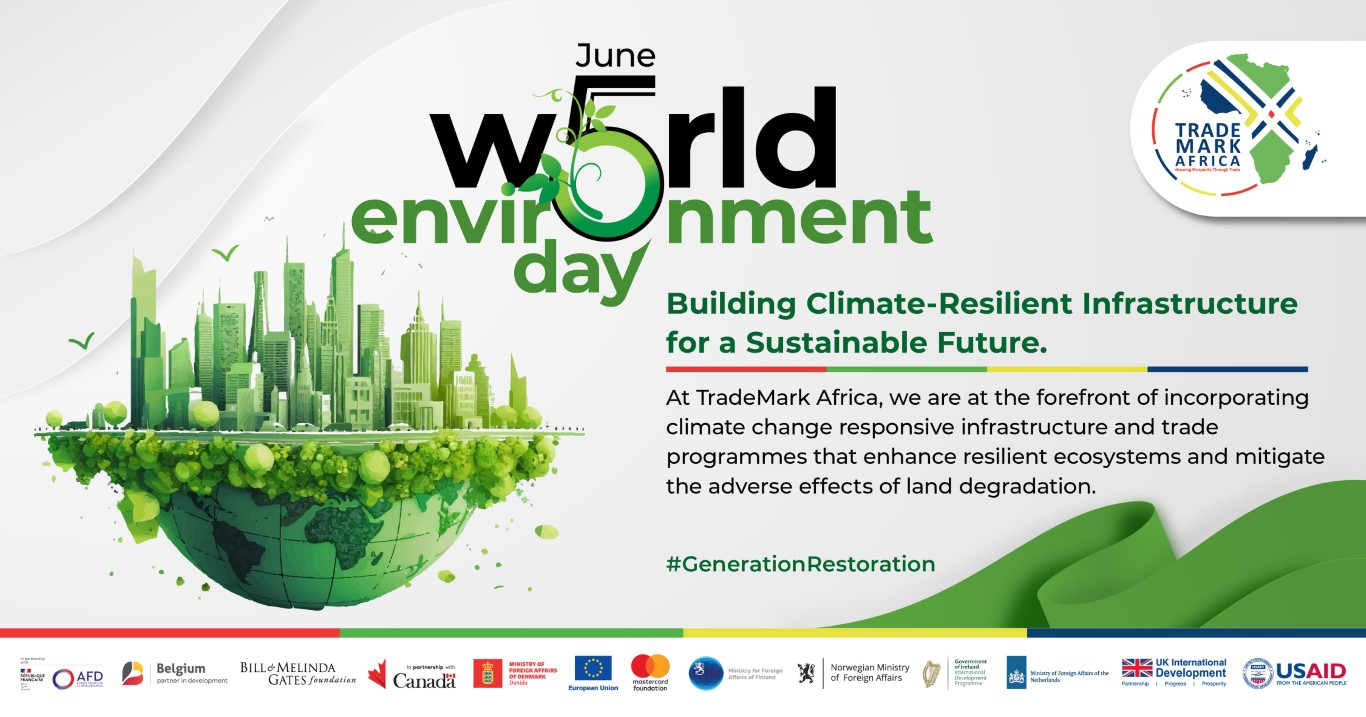By Trizer Omugar, Ben Mbindah and Njoki Mungai (TradeMark Africa)
The United Nations’ World Environment Day (WED), celebrated annually on June 5, marks its 52nd year in 2024 with the global theme, “Our Land. Our Future. #GenerationRestoration.” We emphasise the importance of land restoration to enhance ecological health and productivity by reversing land degradation, halting desertification, and building drought resilience. This year, the Kingdom of Saudi Arabia, known for its vast deserts, will host the event.
Recognising the critical link between economic growth and environmental sustainability, TradeMark Africa (TMA) is alive to its mission of pursuing continental trade facilitation while considering environmental concerns. Africa, where TMA operates, is endowed with rich biodiversity, vast natural resources, and diverse ecosystems, which play a significant role in global trade and economic development. TMA tackles this complexity by designing programmes that promote green trade and logistical operations while making agriculture more sustainable by greening value chains.
- Land degradation
In a rapidly changing global environment, infrastructure development must consider sustainability practices to mitigate the adverse effects of land degradation. TMA (TradeMark Africa) stands at the forefront of this important work, exemplified by its strategic and consistent incorporation of environmental and climate change considerations into its infrastructure projects. A notable case study is the Hargeisa Bypass Road in Somaliland, where TMA and its implementing partners identified climatic hotspots along the route and implemented climate-proofing solutions during construction. This proactive approach ensures that the road not only serves its purpose but also contributes to mitigate land degradation.
Our efforts extend across the region, with a particular focus on borders and ports. At the Ruzizi II One Stop Border Post (OSBP) between Rwanda and the Democratic Republic of Congo (DRC), located in a landslide-prone area, TMA, in collaboration with government partners and funders, continue to prioritise the protection of the OSBP and local communities through robust climate-resilient measures.
TMA is also developing a cross-border market in Elegu, Uganda, near the South Sudan border, an area that regularly combats flooding. The market’s design integrates climate-proofing measures to safeguard the market and the surrounding communities from the recurrent threat of floods. This project underscores TMA’s commitment to creating resilient infrastructure to the region’s climatic challenges.
TMA’s collaboration with the Kenya Ports Authority also highlights a commitment to port resilience. The Mombasa Port’s Green Port Policy, developed with support from TMA, aims to transform the port into a climate-resilient, sustainable, efficient, modern, and competitive gateway into Eastern Africa.
These initiatives underscore our dedication to global land use and environmental management, particularly in fragile land zones. By embedding climate considerations into its infrastructure projects, TMA enhances the sustainability of its developments and plays a crucial role in fostering resilient ecosystems.
- Halting desertification and building drought resilience
Beyond its infrastructure development initiatives, TMA is contributing to increased market access for agricultural value chains. This strategic focus aims to bolster green business competitiveness and reduce the trade barriers that impede progress. Our approach includes working with the private sector to meet sustainability compliance standards, such as through the European Union (EU) Product Environmental Footprint analysis. Since the EU is a critical export market for Africa, TMA’s efforts to increase export-oriented partners’ awareness of EU regulations are important. This includes demystifying the EU Green Deal Policy and the detailed product footprint guidelines, equipping businesses to navigate and grow within these stringent frameworks. By promoting adherence to EU and continental agricultural sustainability standards, TMA fosters sustainable practices that mitigate desertification, support climate-smart farming, and enhance the safety and trade of food products within Africa and globally.
World Environment Day is a powerful global platform to raise awareness and galvanise action for environmental protection. This day underscores the importance of investing in ecosystem restoration, sustainable land management, and biodiversity conservation, efforts that are vital for resilient livelihoods and vibrant ecosystems.
Although TMA has strategically embraced the greening of trade across Africa, the challenges posed by rapid desertification, land degradation, and extreme drought remain formidable. The continent, disproportionately affected by climate change, requires concerted efforts and innovative solutions to reverse these trends.
TMA’s initiatives reflect a commitment to trade facilitation and environmental stewardship. By promoting sustainable practices and compliance with international standards, TMA is paving the way for a greener, more competitive agricultural sector. However, reversing the adverse effects of climate change demands a collective effort from governments, businesses, and communities across the continent.
This year’s World Environment Day theme, #GenerationRestoration, calls for unified and concerted actions to restore our ecosystems. Stakeholders must collaborate, share knowledge, and implement solutions to ensure sustainable development for future generations.
Let us all unite in this important work, declaring unified and concerted efforts to support #GenerationRestoration and embrace the opportunity to create a resilient and thriving continent.















